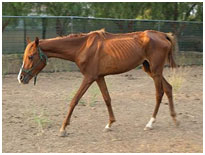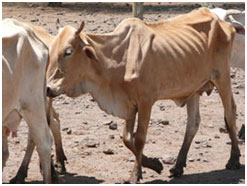Trypanosoma evansi
What to look for (depending on strain)
Cattle
- Chronic wasting.

Infected horse showing signs of chronic wasting
Horses, donkeys and mules
- Fever, weakness, anaemia (pale gums), small pin-point haemorrhages on the nostrils.
- Sometimes swelling of the legs and brisket.

Infected cattle showing signs of chronic wasting
Dogs and cats
- Nervous signs (similar to rabies virus symptoms).
What you can do
- Do not move live animals, meat and dairy products, untanned hides or skins, other animal products or soil out of the Torres Strait Protected Zone to the Torres Strait Permanent Biosecurity Monitoring Zone, or from either zone to mainland Australia without a permit and an inspection by a departmental biosecurity officer.
- Report any of these signs in cattle, horses, donkeys, mules, dogs and cats to the Emergency Animal Disease Hotline on 1800 675 888.

Live animals, meat and dairy products, untanned hides and skins, other animal products and soil need a permit to move south between zones and to mainland Australia.
Profile
Surra is a disease caused by a blood-borne parasite and transmitted by biting flies. It can affect horses, donkeys, mules, deer, camels, llamas, dogs, cats, cattle, buffalo, sheep, goats and pigs. It usually causes chronic wasting in cattle and is often fatal in horses, dogs and cats.
Identification
The signs of surra vary, depending on the strain of the parasite and species infected. In cattle it usually presents as a chronic wasting disease. It can be fatal in cattle, though cattle that recover can become carriers of the parasite. It is usually fatal in horses, donkeys and mules. Symptoms include fever followed by weakness, anaemia and small pin-point haemorrhages on the nostrils, lips and anus. You may also notice swelling of the legs and brisket followed by death. The disease is usually fatal in dogs and cats. Dogs sometimes show nervous signs that can be confused with rabies virus symptoms.
Distribution
Surra is present in many countries of the African continent, the Middle East, some areas of the former Soviet Union, the Indian subcontinent, China, South East Asia (as far east as Timor) and South America. Surveys have shown evidence of infection of Papuan cattle imported from other parts of Indonesia.
Threat
Surra would be difficult or impossible to eradicate if it were to become established in Australia due to the presence of biting flies that can transmit the disease and the parasites could persist in feral animals such as horses, donkeys, deer, camels, buffalo, goats and pigs. Control of the disease in livestock could cost the industry millions of dollars. Studies have shown that some native marsupials such as kangaroos, agile wallabies and pademelons are highly susceptible to surra infection.
Keep a Top Watch!
Surra is most likely to enter Australia through importation of animals already infected with the disease. Keep a watch out for planes or boats in your region that may be carrying animals or animal products.
Keep a watch on wild and domestic animals and if you see more sick or dead animals than usual, call the Emergency Animal Disease Hotline on 1800 675 888.
For further information or advice contact NAQS.